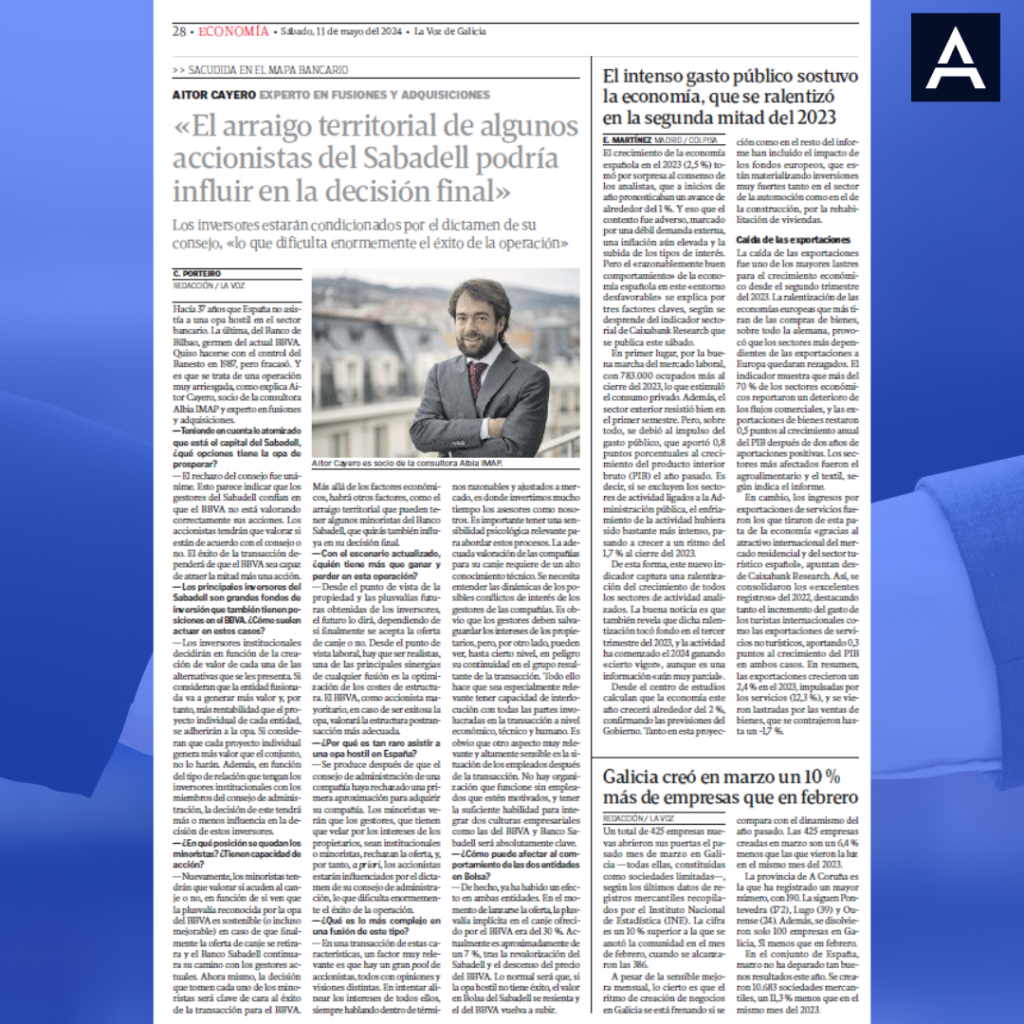Given Sabadell’s fragmented capital, what options does it have to thrive?
Considering that Banco Sabadell’s board of directors rejected the exchange offer, BBVA has launched a hostile takeover bid to try to attract Banco Sabadell’s shareholders to its proposal. The board’s rejection was unanimous, indicating that Sabadell’s managers believe that either by remaining independent or because Banco Sabadell adds more value than recognized by BBVA’s offer in the hypothetical combined BBVA + Banco Sabadell Group, BBVA’s offer is not correctly valuing Banco Sabadell’s shares. Currently, around 66% of Banco Sabadell’s shareholders are retail investors, and they, along with institutional shareholders, will have to assess whether they agree with the board’s decision or not. The success of the transaction will depend on BBVA’s ability to attract more than half of the shares.
The main shareholders of Sabadell are large investment funds that also have investments in BBVA. How do they usually act in these cases?
Institutional investors will decide based on the value creation of each of the alternatives presented to them. If they believe that the merged entity will generate more value, and therefore more profitability, than the individual project of each entity, they will support the takeover bid. If they believe that each individual project generates more value than the combined one, they will not support it.
Additionally, depending on the type of relationship institutional investors have with the members of the board of directors, the board’s decision will have more or less influence on their decision.
What position do retail investors find themselves in? Do they have the ability to act?
Again, retail investors will have to assess whether to participate in the exchange offer based on whether they see the capital gain recognized by BBVA’s bid as sustainable (or even improvable) if the exchange offer were ultimately withdrawn and Banco Sabadell continued its path with its current managers. Right now, the decision each retail investor makes will be crucial to the success of the transaction for BBVA. Beyond economic factors, there will be other factors such as territorial roots that some Banco Sabadell retail investors may also consider in their final decision.
With the updated scenario, who stands to gain the most and lose the most in this operation?
From the perspective of ownership and future capital gains obtained by investors, only time will tell, depending on whether the exchange offer is ultimately accepted or not.
From a labor perspective, we must be realistic; one of the main synergies of any merger is optimizing structural costs. BBVA as the majority shareholder, if the hostile takeover bid is successful, will evaluate the most suitable post-transaction structure.
Why are “hostile takeovers” not common in Spain?
A hostile takeover occurs after a company’s board of directors has rejected a first approach to acquire the company. Retail investors will see that the managers, who are mandated to look after the interests of the owners, whether institutional or retail, have rejected the offer, and therefore, a priori, shareholders will be influenced by the opinion of their board of directors, which greatly hinders the success of the operation.
What is the most complex aspect (in terms of negotiation and management) in a merger operation like the one proposed by BBVA?
In a transaction of this nature, a very relevant factor is that there is a large pool of shareholders, all with different opinions and views. Trying to align the interests of all of them, always speaking within reasonable and market-adjusted terms, is where M&A advisors like us invest a lot of time. It’s important to have significant psychological sensitivity to address these processes.
The proper valuation of companies for their exchange requires a high level of technical knowledge, as well as understanding the dynamics of potential conflicts of interest of the companies’ managers. It’s obvious that managers must safeguard the interests of the owners, but, on the other hand, they may see their continuity in the resulting Group of the transaction up to a certain level in jeopardy. All this makes it particularly relevant to have the ability to interact with all parties involved in the transaction at an economic, technical, and human level.
Obviously, another very relevant and highly sensitive aspect is the situation of employees after the transaction. There is no organization that functions without motivated employees, and having the ability to integrate two corporate cultures like those of BBVA and Banco Sabadell will be absolutely key.
How can this new scenario (hostile takeover bid) affect the behavior of the two entities in the stock market?
In fact, there has already been an effect on the behavior of both entities. At the time the offer was launched, the implicit capital gain in the exchange offered by BBVA was 30%. Currently, it is approximately 8% after the revaluation of Banco Sabadell and the decline in BBVA’s stock price. It is normal that if the “hostile takeover” bid fails, Banco Sabadell’s stock market value will suffer, and BBVA’s will rise again. If the takeover bid is ultimately successful, Banco Sabadell will be absorbed by BBVA, and consequently, the stock market behavior will be that of BBVA, depending on the value creation generated by the merger, first, and then on the evolution of the joint business.

